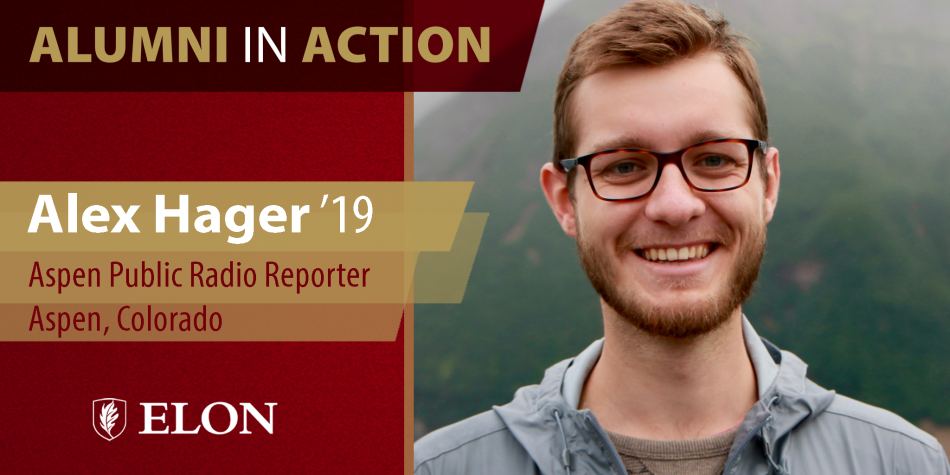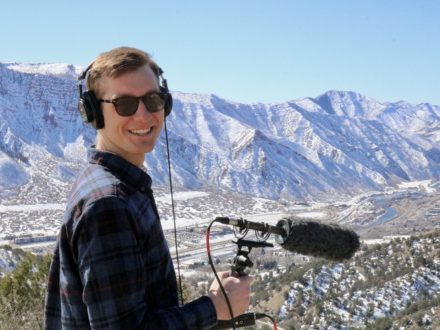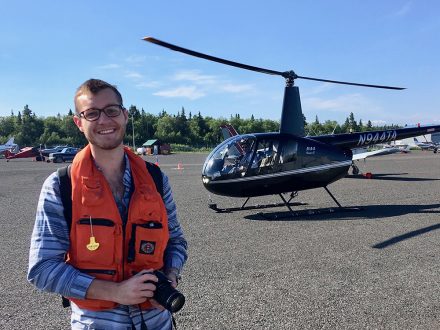The Aspen Public Radio reporter discusses what it’s like to cover the COVID-19 pandemic for a small community and how his job has changed in recent weeks.
 Alex Hager ’19 wakes up every morning and turns on the radio, just as he did as a kid. Now, in addition to hearing NPR, he often hears his own voice reporting the news.
Alex Hager ’19 wakes up every morning and turns on the radio, just as he did as a kid. Now, in addition to hearing NPR, he often hears his own voice reporting the news.
“I was a longtime public radio listener and such a huge fan of it,” said Hager, who now works as a reporter for Aspen Public Radio. “And now being on the other side of that is just such an immense privilege.”

Following graduation, the journalism major packed up and headed to Dillingham, Alaska, a town of 2,500 people that is only accessible by plane or boat. Hager’s official job title at KDLG radio station was “fish reporter,” and he was responsible for providing a nightly report for fishermen who could be at sea for five to six weeks at a time, with the station as their only news source.
“Their way to know what’s going on, to know where they’re allowed to fish, to know how the season is going, to hear the nautical weather was through our radio station,” Hager said. “All of a sudden I stepped into this tremendous responsibility.”
After spending what Hager described as one of the most memorable summers of his life in Alaska, he landed a reporter position in Aspen, Colorado, where he is currently reporting from his apartment bedroom. Since the start of the pandemic, Hager’s normal coverage of the area’s wildlife, skiing and politicians has transitioned to the impact of the coronavirus on the region.
While Hager said his workflow hasn’t changed as much, his content has changed drastically.
“We are just starting to enter an era now where there’s a little bit of other news, but it just seems like, ‘How can you talk about anything else?’” Hager said. “This has impacted every single corner of existence, from employment to health care, to how people spend their time, to what’s going on in people’s heads.”

Localized stories of the novel coronavirus, like Hager’s piece about dealing with respiratory illness at high altitude, are helping his audience understand and prepare for the impact of the disease in their community. In addition to serving as a source of information, Hager said his story about doctors on the frontlines led to an email from a female listener seeking ways to help. Hager said the listener and her friends offered to sew masks for a local hospital’s staff.
“I can’t say that that was all in part due to my story,” Hager said. “But I know that at least one person heard something I reported on, because they depend on us for news, and then went out and decided to do something to help the community.”
While at Elon, Hager worked in every medium, writing for every beat as a member of Elon News Network, the university’s student-run news organization. The experience he gained through student media, Hager said, is what allowed him to grow comfortable on radio and chart his career path.
“The opportunity to have Elon News Network and to try things was tremendous for me,” Hager said. “Because Elon is not a massive school where you really get lost in the crowd, you can pursue your own passion projects and find support for them.”
One passion project Hager worked on during his time as an undergraduate was ENN’s weekly podcast, which he said served as his creative sandbox. Kelly Furnas, journalism lecturer and adviser to The Pendulum, said Hager’s entrepreneurial spirit and curiosity are what make him the journalist he is today.
“If there was something that really caught his attention, he would delve into it,” Furnas said. “He just had this really insatiable curiosity about how things worked, and why things were the way they were. You take curiosity and you take work ethic and that’s really all you need to be an amazing journalist.”


